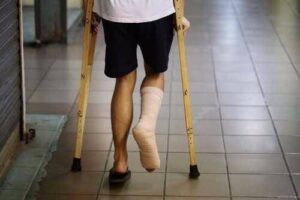If you’ve been injured in an accident in Pennsylvania, you may be entitled to compensation for your losses. However, to receive compensation, you will need to prove that the other party was negligent and caused your injuries. Proving negligence can be challenging, but it is essential to winning a personal injury case.
Negligence is the failure to exercise reasonable care, resulting in harm to another person. In Pennsylvania personal injury cases, the plaintiff must prove four elements to establish negligence: duty, breach, causation, and damages.
- Duty: The first element of negligence is duty. Duty refers to the legal obligation of the defendant to exercise reasonable care towards the plaintiff. For example, a driver has a duty to operate their vehicle safely and obey traffic laws.
- Breach: The second element of negligence is a breach of duty. A breach occurs when the defendant fails to meet their duty of care. In the case of the driver, a breach of duty would be driving while intoxicated, texting while driving, or speeding.
- Causation: The third element of negligence is causation. Causation refers to the link between the defendant’s breach of duty and the plaintiff’s injuries. For example, if the driver’s breach of duty caused a car accident that injured the plaintiff, causation would be established.
- Damages: The fourth element of negligence is damages. Damages refer to the harm that the plaintiff suffered as a result of the defendant’s breach of duty. Damages can include physical injuries, emotional distress, and financial losses.
To prove negligence, the plaintiff must provide evidence to support each element of negligence. This evidence can include witness testimony, medical records, police reports, and expert testimony.
It’s also important to note that Pennsylvania follows the comparative negligence rule. This means that if the plaintiff was partially at fault for their injuries, their compensation may be reduced by their percentage of fault. For example, if the plaintiff was 20% at fault for the accident, their compensation would be reduced by 20%.
Additionally, it’s important to understand the statute of limitations for personal injury cases in Pennsylvania. The statute of limitations is the time limit for filing a lawsuit, and it varies depending on the type of case. In Pennsylvania, the statute of limitations for personal injury cases is two years from the date of the accident or injury.
Failing to file a lawsuit within the statute of limitations can result in the case being dismissed, so it’s important to act quickly and seek legal advice as soon as possible.
In some cases, it may be possible to settle a personal injury case outside of court. This can be a faster and less expensive option, but it’s important to work with an experienced personal injury attorney who can negotiate a fair settlement on your behalf.
If you’ve been injured in an accident, it’s important to take immediate action. Seek medical attention, gather evidence, and consult with a personal injury attorney as soon as possible. An experienced attorney can help you understand your legal options and work towards obtaining the compensation you deserve.
Proving negligence in Pennsylvania personal injury cases requires establishing duty, breach, causation, and damages through evidence. It’s important to understand the statute of limitations and work with an experienced personal injury attorney to protect your rights and obtain the compensation you need to recover from your injuries.
Gibson & Perkins, PC is a law firm that has been serving clients in Pennsylvania and surrounding areas for over 35 years. Our team of experienced personal injury attorneys has a proven track record of helping clients obtain fair compensation for their injuries.
We understand that proving negligence in Pennsylvania personal injury cases can be challenging, and we have the knowledge and resources to help our clients build a strong case. Here are some ways that we can help:
- Investigation: We will conduct a thorough investigation of the accident or incident that led to your injuries. This includes gathering evidence such as witness statements, police reports, medical records, and any other relevant information that can help establish negligence.
- Legal analysis: We will analyze the facts of your case and apply Pennsylvania law to determine the best legal strategy for proving negligence. This includes assessing the strength of your case, identifying potential legal issues, and developing a plan to overcome any obstacles.
- Expert witnesses: We work with a network of expert witnesses who can provide testimony and analysis to support your case. These experts may include accident reconstruction specialists, medical professionals, and economists who can assess the financial impact of your injuries.
- Negotiation: We will work to negotiate a fair settlement on your behalf with the responsible parties and their insurance companies. This includes evaluating any settlement offers and advising you on the best course of action.
- Litigation: If a fair settlement cannot be reached, we will represent you in court and fight for your rights. Our experienced trial attorneys have a strong track record of success in Pennsylvania courts, and we will work tirelessly to obtain the compensation you deserve.
At Gibson & Perkins, PC, we understand that every personal injury case is unique, and we take the time to listen to our clients and understand their needs. We are dedicated to providing personalized, compassionate representation and helping our clients get the justice they deserve.
If you’ve been injured in an accident, contact Gibson & Perkins, PC today to schedule a free consultation and learn how we can help with proving negligence in your Pennsylvania personal injury case.
